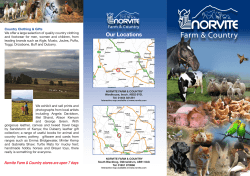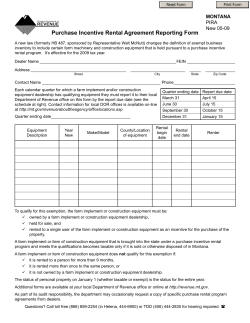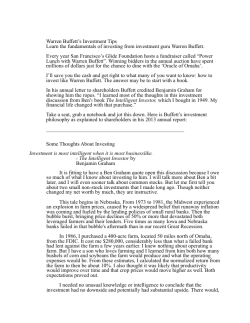
The importance of protecting both flock and farm from resistant... industry experts and an issue that has immediately struck a... • COMMUNIQUE AUX MEDIAS • MEDIENMITTEILUNG
MEDIA RELEASE • COMMUNIQUE AUX MEDIAS • MEDIENMITTEILUNG Newcomers rise to the resistance challenge The importance of protecting both flock and farm from resistant worms is a growing concern for industry experts and an issue that has immediately struck a chord with Ben Anthony and Diana Fairclough of Frowen Farm, Login in Carmarthenshire. The couple took over the 145 acre farm from Diana’s parents in 2010 and rent a further 110 acres. Although from a dairy background, and with 40 suckler cows on the farm, the 620 plus flock is Ben’s passion and he is determined to explore every opportunity to improve productivity and protect the flock. “Suckler cows only have the one calf, with sheep there’s a bigger challenge” says Ben. “You want a good lambing percentage and for animals to be healthy, productive and to finish as well as they can. Wormer resistance is a big threat to us all and everyone should be concerned. I have heard of farms in this area having resistance. I’ve certainly noticed that some of my lambs have been a bit slow to fatten this year, so I have decided to do a Faecal Egg Count test to find out if wormer resistance may be the cause. It’s one of those things that you always know you should do, but never quite get round to, but this has given us that push. I’ve taken samples and sent them off for testing at Carmarthen and Cardiganshire Farmers, a process that was really straightforward.” Because they are fairly new to the sheep industry, both Ben and Diana do a lot of reading and research to find out the best course of action. “For us it’s not a case of doing what we’ve always done, which is actually a big advantage. If I see something interesting, at a show or in the press, I’ll go back and research it, or talk to my on farm advisor or vet to find out more.” Worming routine Using a clear drench has been the preferred approach for Frowen Farm for a number of years, but listening to information from a number of sources, Ben and Diana now understand the importance of using effective wormers and not relying on one group too heavily. “We do our best to follow SCOPS guidelines,” says Ben. “We dose first with white drench at between four and six weeks, which is chosen for its activity against Nematodirus in the spring, then we change to a clear drench. Now, a few weeks after weaning we use Zolvix®, the orange drench, as break dose, to clear out any resistant worms. We work closely with Market Hall Vets who prescribe Zolvix® for our sheep, the lambs perform very well following this dose and, with no resistance issues, it does give us peace of mind. As a recent product it’s one that my father in law, who is now retired, could never have used on the farm.” Ben and Diana have also undertaken a re-seeding programme, following advice from independent grassland consultant Charlie Morgan. A five year sheep grazing mix has been introduced: Timothy for digestibility, white clover and intermediate and late heading perennial ryegrasses. After drenching with Zolvix®, lambs were initially put straight out onto the ‘clean’ reseed or aftermath. However, following advice from their on farm advisor and vet, Ben and Diana now ensure that after treatment with Zolvix, lambs go back onto older ‘dirty’ pasture that has previously carried sheep for 4-5 days. This means that if there were resistant worms on the property these would be picked up by the lambs at the same time as the non- resistant worms, reducing the selection pressure for resistance build-up. “We do the orange drench after weaning, so if there are any resistant worms on the farm that takes them out, then we place them back onto dirty pasture before moving them to the re-seed, or onto aftermath. This ensures the lambs get maximum benefit and we are prolonging the life of the orange drench class.” Never forget quarantine Frowen Farm also follows a strict quarantine procedure when buying in stock. Incoming animals are dosed with Zolvix® to clear out worms, including resistant strains, and are turned out to a designated field before being introduced to the farm’s other pastures. “We have attended few educational meetings now and the importance of quarantine dosing was always top of the agenda. Even if you bought one ram in – and most people do buy rams – you risk bringing resistance in, and if you haven’t got it, you don’t want it.” “We should never forget quarantine,” confirms Lesley Stubbings SCOPS representative, Independent Sheep Consultant and advisor on the Farming Against Wormer Resistance (FAWR) campaign. “At the moment, as an industry we do not take quarantine seriously enough. 32% of farmers are not treating incoming stock, even though this is the time that flocks are most vulnerable. It is vital farmers take professional advice. Only by treating correctly can farmers prevent importing resistance problems. The importance of rotation Ben and Diana take advice from a number or sources which have helped them appreciate the need for a sheep flock health plan which incorporates a worming programme using effective wormers. The plan was built in consultation with Market Hall Vet practice and the wormer programme will be reviewed on the basis of the drench testing they are currently carrying out. “Careful integration of the new groups alongside the 3 older wormer groups (1-BZ white, 2-LV yellow and 3-ML clear drenches), will help extend the useful life of these original wormer classes and farmers should also see benefits in terms of lamb performance,” agrees Lesley Stubbings. “Whilst it is easy to see the value of doing this when you already have obvious wormer resistance to one or more of the older groups, the benefits would be much greater if a farmer was to integrate the new classes into worming programmes at an earlier stage to prevent the problem from occurring”. Attending, and hosting meetings, has led to Frowen Farm becoming a demonstration farm for Farming Connect, the Welsh Government initiative to promote new practices and ideas in farming. From now on, sheep will be sent to Dunbia abattoir at Llanbydder and the farm will get detailed feedback on the carcasses. “Our lambs grade really well, with over 80% grading as E and U grades with good killing out percentages. We’re currently in the process of introducing electronic ID so we’ll be able to take an even closer look at results and monitor our sheep performance. We want our flock to be as healthy and productive as it can be in the future, and for the farm to continue to be profitable, and that means incorporating the orange drench now to prolong the life of the other available wormers.” What to do if you are worried about resistance: 1. Ask for advice - contact your animal health advisor & vet immediately. 2. Find out your AR (anthelmintic resistance) status – perform faecal egg count testing in collaboration with your animal health advisor & vet. 3. Build a flock health plan incorporating worming - ensure wormer choices are effective on your farm & incorporate one or both of the new wormer groups. For further information about ZOLVIX® contact: Novartis Animal Health UK Limited, Frimley Business Park, Frimley, Camberley, Surrey, GU16 7SR. Tel 01276 694402. ZOLVIX® contains 25 mg/ml monepantel. ZOLVIX® is a registered trademark of Novartis AG, Basel, Switzerland. Advice on the use of this or alternative medicines must be sought from the medicine prescriber. Legal category: POM-V. Use medicines responsibly (www.noah.co.uk/responsible). UK/ZOL/13/0126.
© Copyright 2025





















